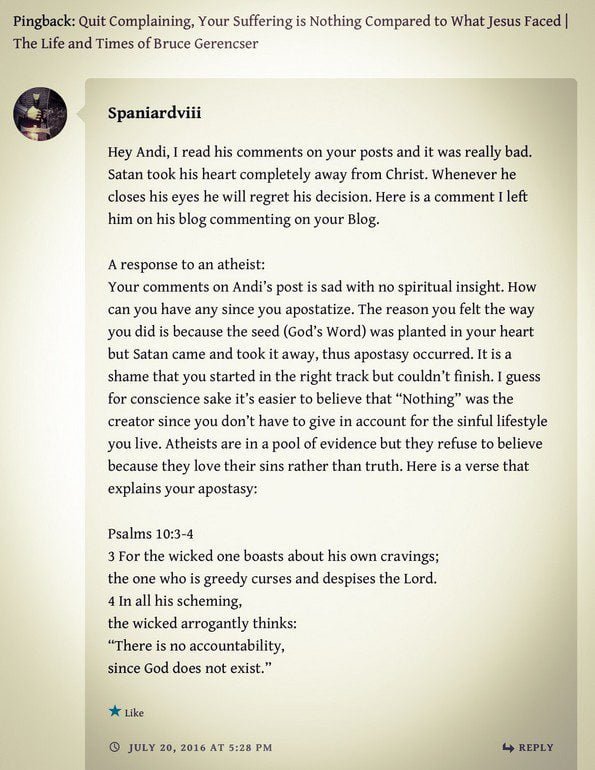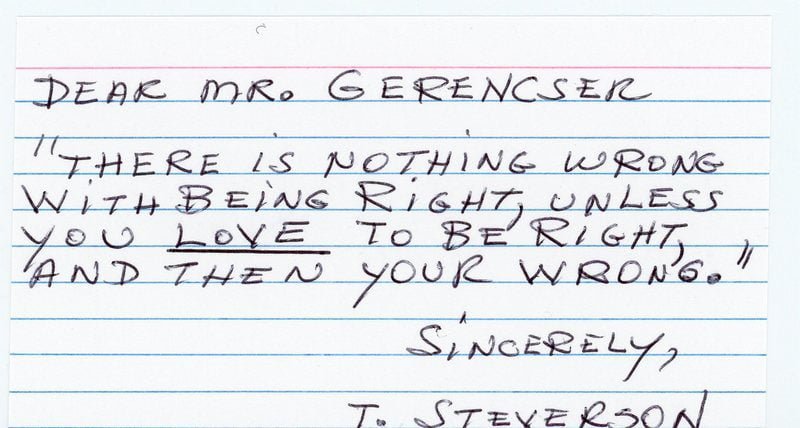
Last November I wrote a post titled Christian Anti-Atheist Blogger Whines About “Secular” Privilege. Yesterday, the author of the post I critiqued, Michael, finally responded. You can read his response here.
Michael didn’t like the fact that I said he spent his days raging against atheism, nor did he like the fact that I said he was a whiner. Such touchy feelings Evangelicals have these days. I have read Michael’s blog for years. My words simply reflect how I view his writing. I could have also said he is hilarious (not in a good sense), ill-informed, and deliberately obtuse, but I wouldn’t want him to get the wrong impression about how I view his anti-atheist screeds. 🙂
What I find interesting is how Michael’s band of fellow anti-atheists responded to my post. What follows are some of the comments posted about me on Michael’s post. Enjoy!
Kevin:
It must be a trend among that brand of atheist to have no reading comprehension. And judging by the words he chooses to employ, such as “raging” and “whining”, then he is also employing the standard tactics of being dishonest and childish.
Just a typical anti-theistic rant that misses the point. Bruce does not distinguish himself from the rest of the juveniles.
SavedByGrace:
Given the fact that he doesn’t see what’s right in front of him and given that he’s already displaying the behavior we’ve come to expect from anti-theist activists, it should be no surprise that he resorts to the usual name calling tactics and doesn’t address the points you’ve made. How are they going to come across as innocent victims of the terrible judgmental Christians if they acknowledge that most aspects of the world today are indeed geared towards them?
nihilisttochristian:
Ah yes, the village atheist, who thinks that his own experiences living in rural America are somehow representative of the Western world as a whole, and/or who cannot get over negative church experiences from decades ago and still considers them representative of the entire Christian body.
natewinchester:
I see at the bottom of each of his posts:
Bruce Gerencser, 64, lives in rural Northwest Ohio with his wife of 43 years. He and his wife have six grown children and thirteen grandchildren. Bruce pastored Evangelical churches for twenty-five years in Ohio, Texas, and Michigan. Bruce left the ministry in 2005, and in 2008 he left Christianity. Bruce is now a humanist and an atheist.
One wonders how he got through 6 kids and 13 grandkids without a better sense of humor. Part of me suspects he plays dumb for the “gotcha.”
There’s a reason I always treasured the truly honest & good-faith atheists. They were rarer than gold.
Kevin:
If he went from being a pastor to mocking Christians, it sounds like his churches probably sucked, because he does too.
I’ve changed my opinion on numerous things, but I don’t mock those who still hold my old opinion. Because I’m not a jackass, for one thing, but also because I understand where they are coming from even if I no longer agree. If anything I would feel sympathy, not contempt.
Bruce has nothing to offer anyone, based on his online persona.
SavedByGrace:
I’ve heard of this situation sometimes, Pastors who have left the ministry sometimes after many years and become anti-theists. I can’t tell what reasons Bruce left Christ, because I don’t know his heart and it could be for a myriad of reasons. In several of the ministries I watch, they’ve mentioned people leaving the church even as Pastors and aren’t malicious about them whatsoever. Some members have even witnessed to them so that Christ might possibly convict them and bring them back to repentance. They were met with replies of “I don’t need Christ to be happy. I’m financially successful now, I have a loving family. etc.” By his arguing though, he seems to be sensitive about atheism being criticized at all, somewhat like how Mehta balked at having to turn his anti-Christian vitriol down. Whether or not it’s too late for Bruce to be saved, I can’t know. But I continue to pray for him to repent, nonetheless. The lake of fire and sulfur is somewhere we should never want anyone to end up for the absence of time.
Kevin:
He seems to be one of those who suffered some sort of tragedy in his past and could not comprehend why God would allow such a thing. In another post he wants Christians to also lose their hope in order to lose their faith, since apparently losing their faith is his goal regardless of the pain he admits this will cause.
Worse men than Bruce have been called by God and answered that call. Perhaps his mockery is a defense against the pain he feels, as though refusing to admit God is real is easier than understanding why bad things happen under grace. God knows his heart and can work as he wills.
That said, I feel comfortable calling out his behavior for what it is.
Dhay:
Yesterday, Michael, a Christian (Evangelical?) blogger who spends his days raging against atheism…
There’s projection for you.
I see Michael posted ten posts in the month of December 2021, ten in November, eight in October, that’s twenty eight in three months; whereas Bruce Gerencser posted thirty four posts in the mere two weeks of 11 — 24 January 2022 inclusive: that is, Gerencser has posted more posts in a recent fortnight than Michael has posted in the most recent completed three months.
Indeed, Gerencser recently posted more posts — nine posts — on one single day (11 January 2022) than Michael posted in the whole of October.
That’s good reason to reckon Gerencser thoroughly irrational.
Gerencser’s flood of posts is a flood of raging posts; he’s an ex-Evangelical Christian blogger who genuinely does himself spend his days raging. The which he accuses Michael of.
There’s massive projection for you.
Dhay:
Bruce Gerencser seems to detest what he considers to be modern distortions of Jesus and his message. But I observe that theologian NT Wright disagrees with significant aspects of the modern image of Jesus (and Paul) — albeit without apparent detestation — so Gerencser’s in good company there.
I also see early posts, 2006 and 2008, which indicate Gerencser was socially and theologically intelligent. I’ve not looked at further early posts, or in more detail at recent posts; I see no reason to make doing so any sort of priority.
Kevin:
That post was mainly a complaint that people envision a Jesus who isn’t a modern left-wing activist, so in typical progressive fashion he presents the worst depiction of conservatives and uses it to attack both them and the non-leftist Jesus.
Perhaps I am not sympathetic enough to Bruce. I will reflect on that.
Dhay:
Kevin > Perhaps I am not sympathetic enough to Bruce. I will reflect on that.
You and I should avoid getting overly sympathetic, his current anti-Christian ranting is not socially and theologically intelligent.
Kevin:
his current anti-Christian ranting is not socially and theologically intelligent.
Not even a little intelligent, true. But it also seems he is one of those who got hurt, or someone close to him got hurt, and God’s “failure” to prevent it has made him angry not only at God but those who are still joyful in their faith. Hence how he wants all believers to begin demanding of God why he allows bad things to happen, so that they too can join him in the loss of all hope.
So he rejects God due to the inane, shallow “reasoning” of New Atheism – which frankly takes a lot of ignorance (which he doesn’t possess) and/or a lot of hatred to adopt – and he lashes out at those who still believe with juvenile contempt and scorn. His is not a position of intellectual, but emotion. If my analysis is correct, he is hurting, and hurt people do silly but regrettable things sometimes.
Of course, if my analysis is incorrect and he actually hopped onto the New Atheist bandwagon because he was somehow convinced by their ridiculous propaganda and catch phrases, then I gave him too much credit by far.
— end of comments
There ya go, boys, girls, and non-binary people. I have no idea who they are talking about. 🙂 This Bruce they are talking about is stupid, ignorant, irrational, lacking intelligence, socially unintelligent, theologically unintelligent, the village atheist, and a new atheist. This Bruce spends his days and nights raging against True Christianity®. This Bruce was a terrible pastor, someone who was “hurt” and is in emotional “pain.” I don’t know this Bruce, do you? 🙂
Bruce Gerencser, 68, lives in rural Northwest Ohio with his wife of 47 years. He and his wife have six grown children and sixteen grandchildren. Bruce pastored Evangelical churches for twenty-five years in Ohio, Texas, and Michigan. Bruce left the ministry in 2005, and in 2008 he left Christianity. Bruce is now a humanist and an atheist.
Your comments are welcome and appreciated. All first-time comments are moderated. Please read the commenting rules before commenting.
You can email Bruce via the Contact Form.











